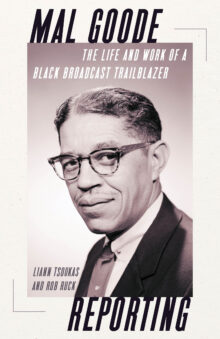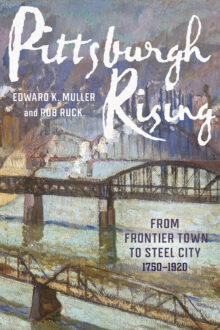

Rob Ruck
Rob Ruck is a historian at the University of Pittsburgh, where he teaches and writes about sport. He focuses on how people use sport to tell a collective story about who they are to themselves and the world. He is the author of Tropic of Football: The Long and Perilous Journey of Samoans to the NFL, Raceball: How the Major Leagues Colonized the Black and Latin Game, and Rooney: A Sporting Life, among other titles. His documentaries Kings on the Hill: Baseball’s Forgotten Men and The Republic of Baseball: Dominican Giants of the American Game appeared on PBS.
Mal Goode Reporting
The Life and Work of a Black Broadcast Trailblazer
Mal Goode (1908–1995) became network news’s first African American correspondent when ABC News hired him in 1962. Raised in Homestead and Pittsburgh, he worked in the mills, graduated from the University of Pittsburgh, and went on to become a journalist for the Pittsburgh Courier and later for local radio. With his basso profundo voice resonating on the airwaves, Goode challenged the police, politicians, and segregation, while providing Black listeners a voice that captured their experience. Race prevented him from breaking into television until Jackie Robinson dared ABC to give him a chance. Goode was uncompromising in his belief that network news needed Black voices and perspectives if it were to authentically reflect the nation’s complexities. His success at ABC initiated the slow integration of network news. Goode’s life and work are remarkable in their own right, but his struggles and achievements also speak to larger issues of American life and the African American experience.
Pittsburgh Rising
From Frontier Town to Steel City, 1750-1920
Over 170 years, Pittsburgh rose from remote outpost to industrial powerhouse. With the formation of the United States, the frontier town located at the confluence of three rivers grew into the linchpin for trade and migration between established eastern cities and the growing settlements of the Ohio Valley. Resources, geography, innovation, and personalities led to successful glass, iron, and eventually steel operations. As Pittsburgh blossomed into one of the largest cities in the country and became a center of industry, it generated great wealth for industrial and banking leaders. But immigrants and African American migrants, who labored under insecure, poorly paid, and dangerous conditions, did not share in the rewards of growth. Pittsburgh Rising traces the lives of individuals and families who lived and worked in this early industrial city, jammed into unhealthy housing in overcrowded neighborhoods near the mills. Although workers organized labor unions to improve conditions and charitable groups and reform organizations, often helmed by women, mitigated some of the deplorable conditions, authors Muller and Ruck show that divides along class, religious, ethnic, and racial lines weakened the efforts to improve the inequalities of early twentieth-century Pittsburgh—and persist today.


